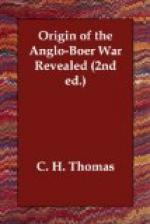Then, in about 1870, came the discovery of the diamond-fields, situated on the then still ill-defined western limits of the State. According to a boundary line claimed by Great Britain, those diamond-fields fell outside Free State territory. That State received L90,000 compensation for improvements and expenses incurred during its short occupation of that disputed strip of diamondiferous ground. The diamond-fields at Jagersfontein and Koffyfontein were subsequently discovered and lie deep within the confines of the State. President Brand had proved his sagacity and discretion in concluding the negotiations with England upon the question of the peace with the Basutos and then again in submitting to the boundary delimitations, it being contended even yet that the Orange Free State had the weightier arguments in its favour in both instances.
The people of that Republic proved however to be the ultimate gainers in those adjustments; they did not miss the more solid advantages attending the discovery of the diamond-fields. Believed of the grave responsibility involved in governing a turbulent population of foreign diggers, the geographical position of the Kimberley fields secured to the Free State farmers an almost entire monopoly in the supply of products; trade also flourished apace, all tending to enrich the inhabitants and the State revenue as well.
But the Orange Free State derived a permanent advantage, quite unique and more than compensating the apparent set-back suffered by the loss of the diamond-field territory and by British intervention in the Basuto war matter, in that the method of those procedures saddled England with the responsibility of guaranteeing the internal safety of the State from those hitherto unprotected borders “altogether at her own cost.” The Keate award completed the British cordon around the Free State, excepting only in regard to the Transvaal frontier. No need thenceforth for costly military provisions for the protection of the State—it was, as it were, walled and fenced in at British expense, and the State revenue was thus for ever relieved of a very heavy item of expenditure, which could be devoted to the increase of the national wealth instead—a peaceful security accompanied with an intrinsic gain constituting a veritable and permanent heirloom for the people of that State.
It is notable that the position of the Orange Free State, without any other access to the sea-board than from colonial ports, made its status and welfare entirely dependent upon the friendly and loyal good faith of England. Up to the present unhappy war that State enjoyed unaltered the best relations without being ever subjected to even a trace of chicanery from the part of Great Britain.




